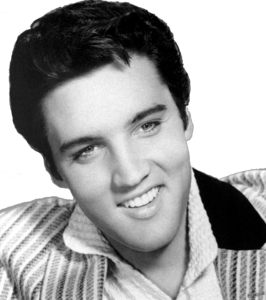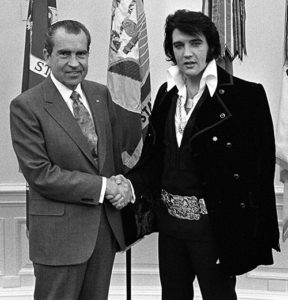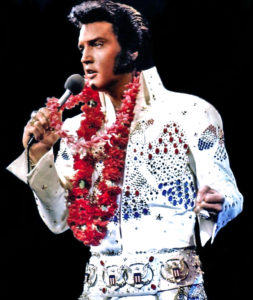
Born: January 8, 1935, in Tupelo, Mississippi
Died (supposedly): August 16, 1977, Memphis, Tennessee
Member of the Silent Generation
Nicknames: The King of Rock and Roll, Elvis the Pelvis
Elvis Presley is one of those artists who is commonly known primarily by his first name. He was truly the world's first superstar (or maybe the second, after Frank Sinatra). During his career, which ran (off and on) from 1954 until his death, he released a total of 111 singles, 33 of which reached #1 on the singles charts. He also released an astounding total of 193 albums, including studio releases, live albums, soundtracks, box sets, and compilations (92 of which came out after his death). He remains the best selling solo artist of all time, and second only to The Beatles for best selling artist overall.
Elvis is the only legitimate choice to occupy the prime spot in the inaugural class of The Skinner Zone Rock and Roll Hall of Fame. Despite the fact that he did not write his own songs (he would be the last major artist to not do so before The Beatles made it an unofficial requirement that future artists create their own material), he made other songwriters' creations his own with his unique and provocative style of performance. During the mid to late 1950s, he drove everybody crazy. He drove the older G.I. Generation into a frenzy by swiveling his hips when he performed, which created a big scandal in the culturally conservative Fifties. He drove the younger Silent and Boom Generations into a frenzy by swiveling his hips when he performed, which created a lot of sexual tension in the female portion of such generations and sparked a spirit of rebellion amongst the male portion thereof. To put it another way, the older generation considered the coming of Elvis to mark the end of Western Civilization, while their kids just ate it up. One uptight Catholic wrote a letter to FBI director J. Edgar Hoover in 1956, complaining that Elvis was a threat to America's national security because, amongst other things, he autographed the abdomen of one high school girl and the thigh of another.
The first phase of Elvis' career came to an end just two years after the release of his first record, "Heartbreak Hotel," when he was drafted. He spent the next two years in the Army, during which he was stationed in West Germany. Although he "banked" a lot of records which were released at regular intervals while he was in the Service, his career went into decline. Rock and Roll itself went into a decline of sorts, as the energetic music of Elvis and his contemporaries was replaced by the softer sound of crooners like Bobby Vee, the Four Preps, the Dixie Cups, and other purveyors of early 1960s schlock. It was also during this time that Phil Spector began to inflict his Girl Group crap upon the record-buying public, his first cultural crime against humanity.

Of course, Elvis resumed his career upon being discharged from the Army. However, it wasn't quite the same. Although he continued to record and release records, many of which were as good as those he released from 1956-58, his main focus became motion pictures. He starred in a number of mostly forgettable films during the 1960s, the quality of which decreased over time. The quality of the music in most of these films was also problematic at best. His low point came in 1967, when most serious music lovers considered him to be a joke and a has-been.
The following year, Elvis reinvented himself with his '68 Comeback Special, which was broadcast on television in December. This was a roaring success; Elvis was back in the building. In an interesting coincidence, Elvis' career had originally gone into decline while The Beatles were beginning to make it big, while his comeback came at the time they were beginning to fall apart as a group. From the late 1960s and into the early '70s, Elvis released a number of recordings, many of which ranked up there with the best from his earlier career. "If I Can Dream" led the way, followed by "Suspicious Minds," "In the Ghetto," "Burning Love," "My Way" (also recorded by Frank Sinatra during this period), and others. He began touring again, and once more performed in sold-out venues.

One of the most bizarre episodes in American political history took place in 1970, when Elvis met with President Nixon at the White House. He was trying to get Nixon to appoint him as a "Junior G-Man," so that he could have an official badge to add to his collection. He painted a picture of himself to the president as a patriotic American who felt disdain for hippies, the drug culture of the 1960s, and the counterculture that had arisen over the past several years. He warned Nixon about The Beatles, claiming that they were an example of anti-Americanism. This was rather odd, considering the fact that he regularly performed their songs in concert. He also criticized their drug abuse, which was ironic when you consider that drugs were the major cause of his own final decline and death.

The final decline of Elvis Presley began in 1973, when his divorce from his wife, Priscilla, became final. His health began to fail as he became addicted to various prescription drugs. In addition, he became obese, which led to a plethora of "Fat Elvis" jokes that would become a staple for many a stand-up comic as time marched on. The end came on August 16, 1977, when he was found dead in his bathroom. Elvis had now left the planet.
Or had he? Many people believe, with some justification, that Elvis didn't really die. There is a school of thought that holds that he left Memphis and embarked upon yet another career, when he took to working as a clerk at 7-Eleven stores all across America. Numerous Elvis sightings have confirmed this to be the case. In fact, 7-Eleven owes its status as the number one convenience store chain in the world to the hordes of shoppers who go there, hoping to buy a Slurpee from The King.
Elvis continues to live on in spirit as well, as his legacy has only increased since he faked his death. He still sells tons of records every year, and will retain his status as a pop culture icon for generations to come. In addition, he has created an entire industry of Elvis impersonators, many of whom make a decent living by dressing up and performing as The King, complete with sequined suit, sunglasses, tight leather pants, and hips that swivel.
